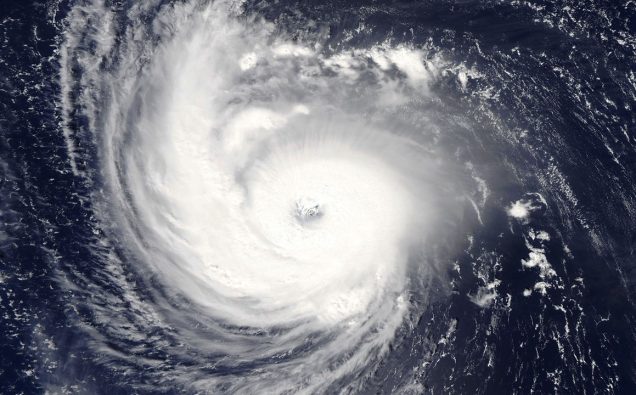
A NASA image of Hurricane Florence on September 11, 2018
As the region braced for a threatening Hurricane Florence landfall, Governor Ralph Northam Wednesday said Virginia has opened two state-managed shelters to assist residents evacuating the storm zone.
The state shelters at Christopher Newport University in Newport News and at the College of William and Mary in Williamsburg will provide additional capacity to assist residents leaving areas of Virginia under mandatory evacuation orders, and those coming into Virginia from other states who have nowhere else to shelter, the Governor’s office said.
According to the National Hurricane Center, Florence is forecast to approach and slowly move southwest along the Carolina coastline Thursday night into Saturday.
“This slow motion will bring a persistent, life-threatening storm surge, and, excessive to historic rains, locally up to 40 inches,” the forecast warns.

he National Hurricane Center’s five-day track and intensity forecast cone for the sixth storm of the 2018 Atlantic hurricane season. Image: National Hurricane Center via Wikimedia
By Wednesday evening Florence – one of the biggest storms on the Eastern Seaboard – was heading toward South Carolina as a category 3 storm with sustained winds of up to 120 mph. President Donald Trump and governors Henry McMaster and Roy Cooper of South Carolina and North Carolina have urged more than one million people in the path of the hurricane to evacuate.
Hurricane conditions are anticipated to hit the region within 36 hours with large parts of the coast from South Santee River in South Carolina to Duck, North Carolina.
In Virginia, currently, 24 localities are opening local shelters for their residents. The two state shelters augment the Commonwealth’s ability to assist citizens in need, a statement said.
“Virginians are heeding our advice to seek higher ground and safe shelter in advance of Hurricane Florence,” said Governor Northam.
“We encourage citizens to seek shelter first with friends and family, to consider hotels outside of evacuation areas, and then look to local shelters, and lastly to state shelters. Leave early. Plan to be off the roads before the storm arrives to avoid unsafe driving situations and traffic congestion, and stay put until the storm passes.”
Watch out, America! #HurricaneFlorence is so enormous, we could only capture her with a super wide-angle lens from the @Space_Station, 400 km directly above the eye. Get prepared on the East Coast, this is a no-kidding nightmare coming for you. #Horizons pic.twitter.com/ovZozsncfh
— Alexander Gerst (@Astro_Alex) September 12, 2018
If an event’s actual or projected demand for sheltering exceeds the local jurisdiction’s capabilities, mutual aid agreements are activated between other communities. When necessary, the Commonwealth provides assistance to local and regional sheltering operations and can operate state-coordinated regional shelters.
Governor Northam’s office released this information about the shelters.
No identification or proof of residency is required to seek shelter.
For a list of shelters open in your area, visit your local government’s website and social media pages.
Bring your personal emergency-kit with you to the shelter. For information on putting together an emergency kit, visit http://www.vaemergency.gov/emergency-kit/.
Be sure to include medications, hearing aid batteries, reading glasses, special medical equipment (oxygen tank, tubing, nebulizer kits, catheters, etc.).
If you have electrical medical equipment that will need to be recharged, bring the appropriate charging cords, spare batteries and other equipment with you to the shelter.
If your medication has run out, please bring your prescription bottle.
For more information about locally available social services you can contact 2-1-1 statewide, or in some communities, you can call 3-1-1- for local information.
If you need more shelter information, you can contact your locality social services department. Individuals contacting 2-1-1 who require relay service due to hearing impairment need to dial 7-1-1 for Virginia Relay then 1-800-230-6977.
Service animals will be permitted at all shelters.
Services will be available for people with disabilities and/or with access and functional needs regardless of whether they are accompanied by personal care providers or family.
State-coordinated shelters will provide only basic, necessary services and support to help ensure disaster survivors are able to stay safe, healthy and can begin the recovery process.
















